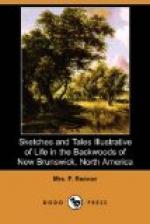“Was a form of life
and light,
That seen became a part of
sight,
And comes where’er I
turn mine eye,
The morning star of memory.”
Ella’s mother was sister to my father: she lived but long enough to look upon her child, and her husband died of a broken heart soon after her. Thus the very existence of the fair girl was fatal to those who best loved her—not best, for all living loved her. In after-years it seemed as though it was her beauty, that fatal gift, which ne’er for good was given to many, caused her woe. Ella’s spirit was pure and bright as the eyes through which it beamed—the gladness of her young heart’s happiness rung in the silvery music of her voice, and in the fairy magic of her smile she looked as if sorrow could never dim the golden lustre of her curls, or trace a cloud on her snowy brow—gentle and lovely she was, and that was all. There was no depth of thought, no strength of mind, to form the character of one so gifted. Her faculties for reasoning were the impulses of her own heart: these were generally good, and constituted her principle of action—but changeful as the summer sky are the feelings of the human heart, unswayed by the deeper power of the head. Such were Ella’s, and their power destroyed her. Alas! how calmly can I talk now of her faults; but who could think of them when they looked upon her, and loved her as I did—’tis only since she is gone I discover them.
Of the other members of the family I need not speak, as you already know of them; but there is one whose name you have never heard, for crime and sorrow rest with it, and oblivion shrouds his memory. Conrad Ernstein was also my cousin, and an orphan—he was an inmate of our dwelling, and my mother was to him as a parent. He was some years older, but his delicate constitution and studious mind withdrew him from the others, and made him the companion of Ella and myself. I have said that Ella’s mind was too volatile, so in like degree was Conrad’s, in its deep unchanging firmness and immutability of purpose. Nothing deterred him from the pursuit of any object he engaged in—obstacles but increased his energy to overcome and call forth stronger powers of mind—this was observable in his learning. Science the most abstruse and difficult was his favourite study, and in these he attained an excellence rarely arrived at by one so situated.
Wondered at and admired by all, his pride which was great was amply gratified, and what was evil in his nature was not yet called into being—his disposition was melancholy, and showed none of the joyousness of youth—yet that very sadness seemed to make us love him all the more—his air of suffering asked for pity—’twas strange to see the glad-hearted Ella leave my mother’s side, while she sang to us the songs of the blue Rhine, and bend her sunny brow with him over the ancient page of some clasped volume, containing the terrific legends of the “black forest,” till the tales of the wild huntsmen filled her with dread—then again would she spring to my mother, and burying her head in her bosom, ask her once more to sing the songs of her native land, for so we still called Germany; and, as you see, the romances and legends of that country formed our childhood’s lore, my early love for Ella grew and increased with my years, and I fancied that she loved me.




